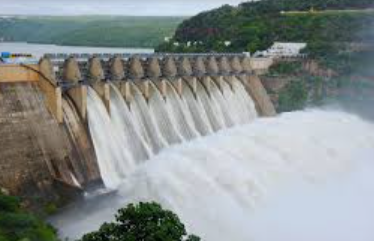As the Cameroonian authorities announce plans to release water from the Lagdo Dam into the River Niger and River Benue, Nigerian states situated along the anticipated flood path are mobilizing efforts to protect their residents. This proactive response is crucial, given the potential for significant flooding that could impact thousands of lives and properties in affected areas.
The Federal Government of Nigeria issued a warning on Tuesday regarding this water release, prompting immediate action from local governments and emergency management agencies. Umar Muhammed, the Director General and Chief Executive Officer of the Nigeria Hydrological Services Agency, identified 11 states at risk, which include Adamawa, Taraba, Benue, Nasarawa, Kogi, Edo, Delta, Anambra, Bayelsa, Cross Rivers, and Rivers. These states are now actively preparing for the impending flood.
In Nasarawa State, officials are taking significant steps to mitigate the effects of potential flooding. Danladi Obagu, Director of Planning, Research, and Statistics at the Nasarawa State Emergency Management Agency, informed the state has begun establishing temporary settlements for residents in flood-prone areas. He emphasized the importance of sensitization campaigns, which have already been launched across the state’s 13 local government areas.
Obagu noted, “In preparation for the impending flood, venues for the temporary settlement of displaced persons are already being established in flood-prone areas across the state.” He also mentioned that officials have been deployed to key councils, such as Nasarawa, Toto, Doma, Awe, Lafia, Obi, Karu, and Akwanga, to assess and respond to potential flooding scenarios. Efforts are underway to provide relief materials to displaced persons to alleviate the hardships they may encounter.
Similarly, in Benue State, the government is preparing for the worst. Aondowase Kunde, the Commissioner for Humanitarian Affairs and Disaster Management, revealed that the state is identifying facilities to serve as temporary shelters for flood victims. A technical committee focused on flood disaster preparedness has been established, identifying at least 18 local government areas at risk, including Makurdi, Guma, Gwer West, and Katsina-Ala.
Kunde stated, “This committee has earmarked camps to relocate would-be victims in case of flooding,” identifying specific locations such as the International Market, LGEA Primary Schools in Wurukum and Demekpe, and Akume Atongo Stadium. He urged residents in riverine areas to begin relocating to safer locations as a precautionary measure.
In Taraba State, the government has placed both the State Emergency Management Agency and the National Emergency Management Agency on high alert. Commissioner for Special Duties and Humanitarian Affairs, Saviour Noku, confirmed that awareness campaigns are being conducted through radio and social media to inform residents about the potential dangers they face.
Noku stated, “We are working tirelessly to ensure that people understand the gravity of the situation and take necessary precautions.” To facilitate emergency responses, the state government has deployed three speedboats for patrols, ensuring swift evacuations in areas that may become isolated due to rising waters.
The Kwara State government has also taken proactive measures to address the flood threat. Commissioner for Communication, Bola Olukoju, shared that various government agencies have been conducting public education programs on flooding and mitigation strategies. These initiatives include community outreach through local radio stations and engaging community leaders to convey critical information.
In addition to these programs, the government has undertaken de-silting of drainage systems and water passages in urban areas to prevent exacerbation of flooding. In riverine communities, traditional leaders are engaging residents to encourage relocation to designated safer areas.
Meanwhile, in Borno State, the police have issued guidelines to manage the aftermath of recent flooding in Maiduguri. The state Commissioner of Police, Mohammed Yusufu, emphasized the collaboration between law enforcement and relevant agencies to maintain order and safety during this challenging time. Residents are urged to remain vigilant, report suspicious activities, and avoid flooded areas to minimize their risk of waterborne diseases and other hazards.
As the release of water from the Lagdo Dam approaches, states across Nigeria are taking decisive actions to prepare for potential flooding. Through the establishment of temporary shelters, public education campaigns, and heightened emergency response readiness, these states are working to safeguard their residents. The proactive measures being implemented underscore the importance of community awareness and preparedness in the face of natural disasters. As authorities continue to monitor the situation, the hope is that these efforts will mitigate the impact of flooding and protect vulnerable populations.